Answered step by step
Verified Expert Solution
Question
1 Approved Answer
7:39 Back Passport Paper PDF.pdf COM 4430 Paper Topic Ill 5G 38 You need to: Choose one of the country passport documents to read,
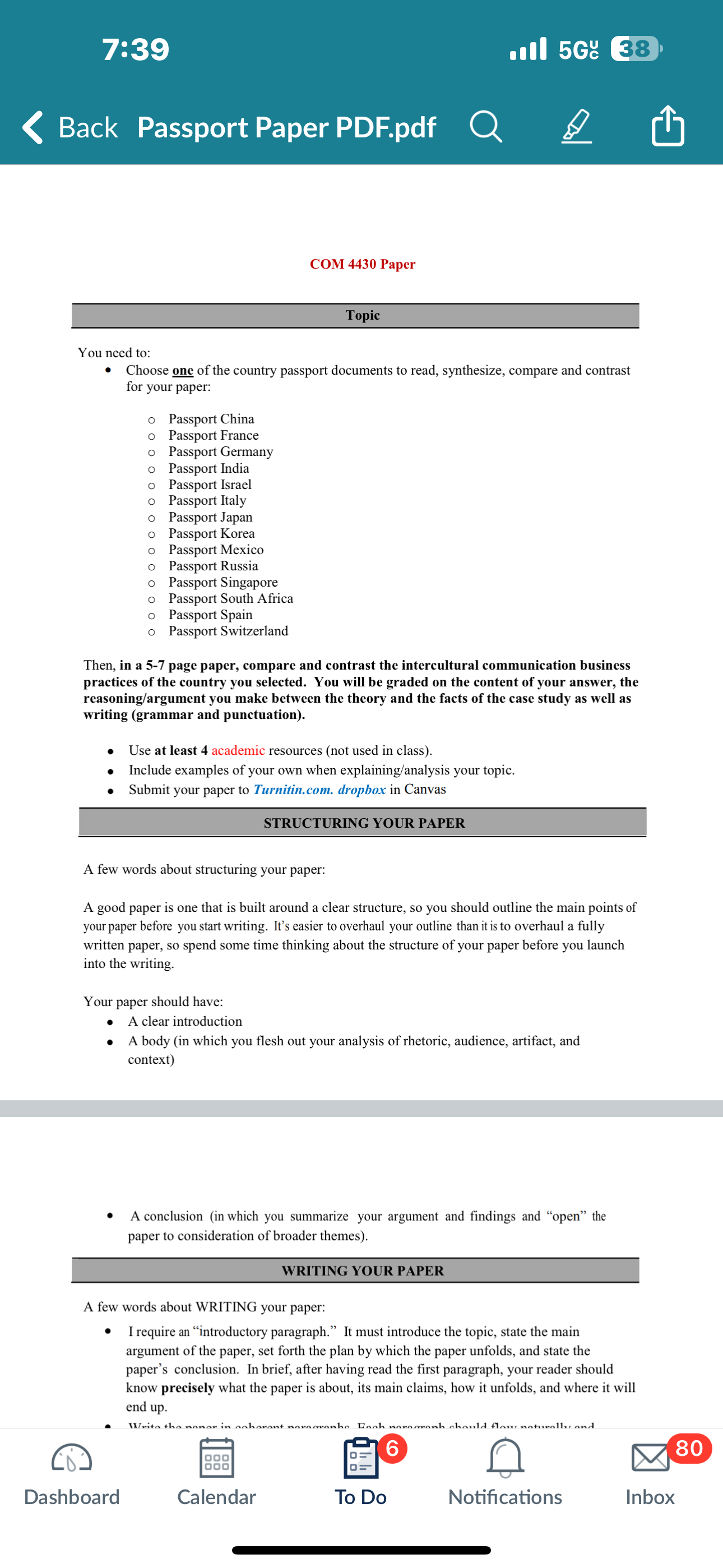
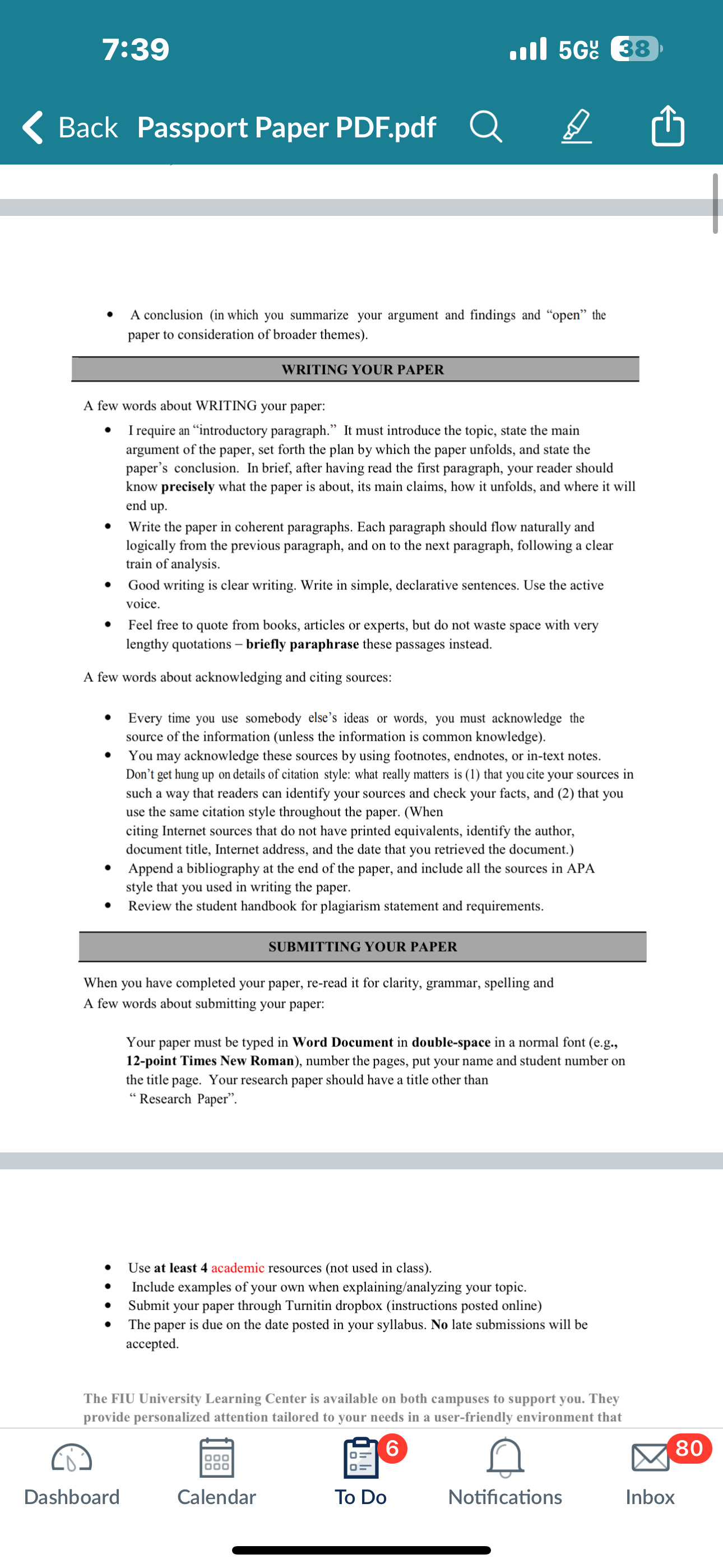
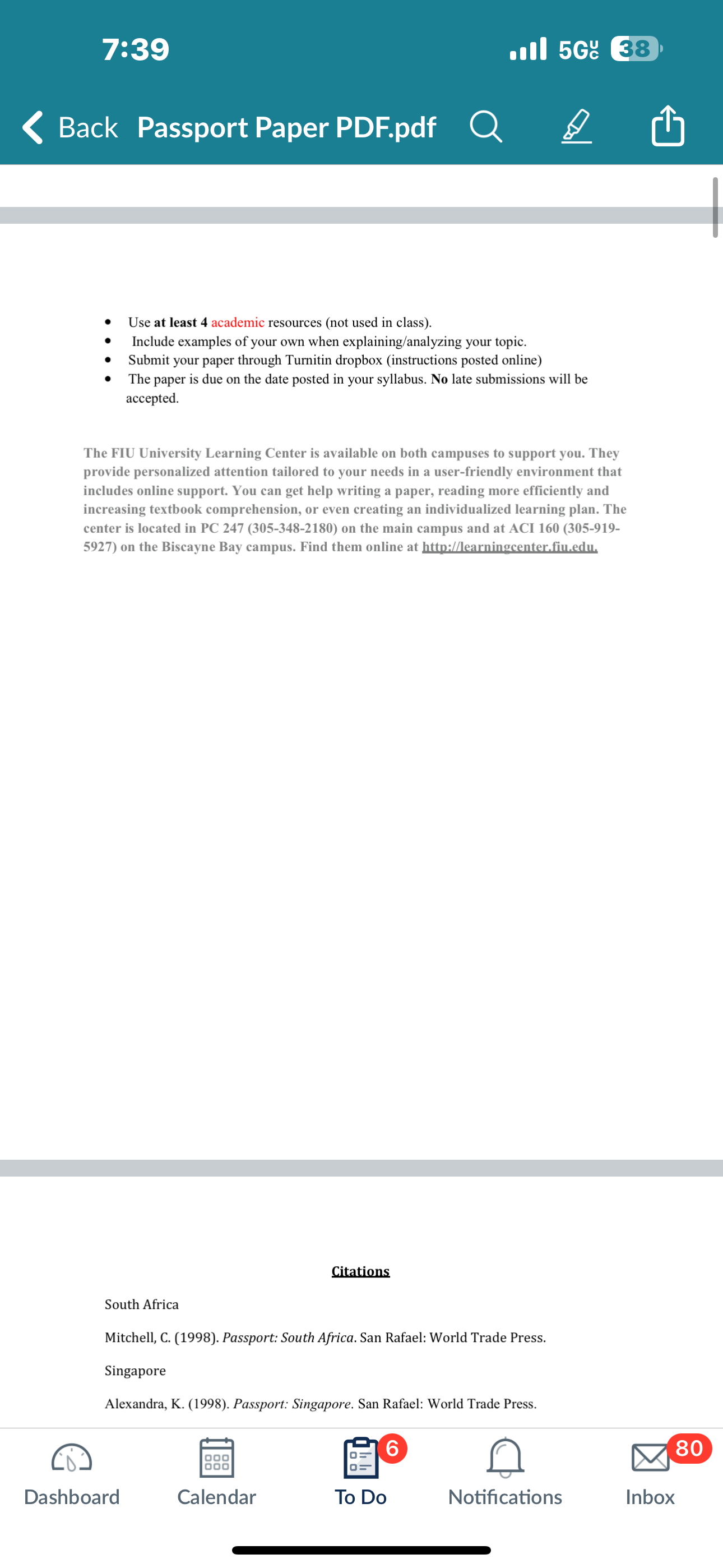
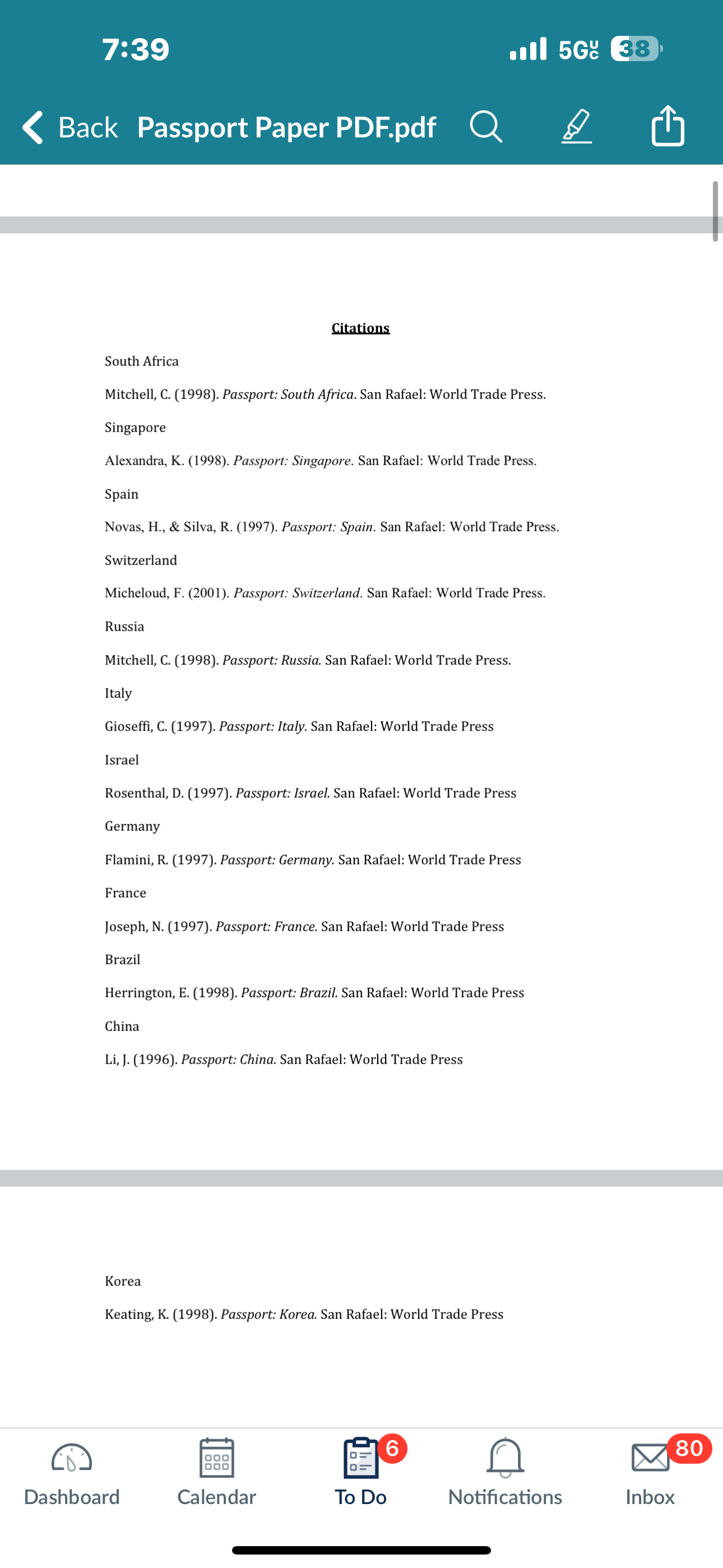
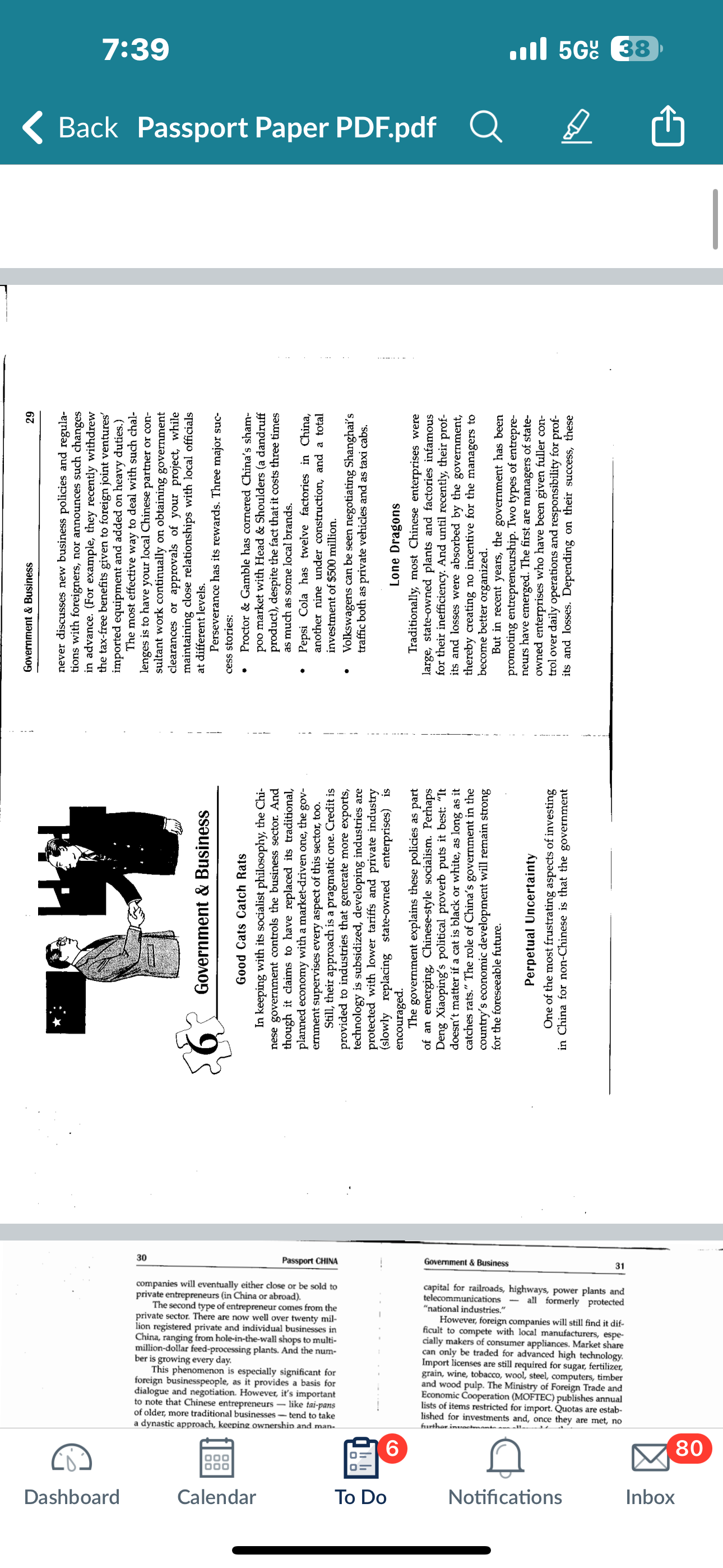
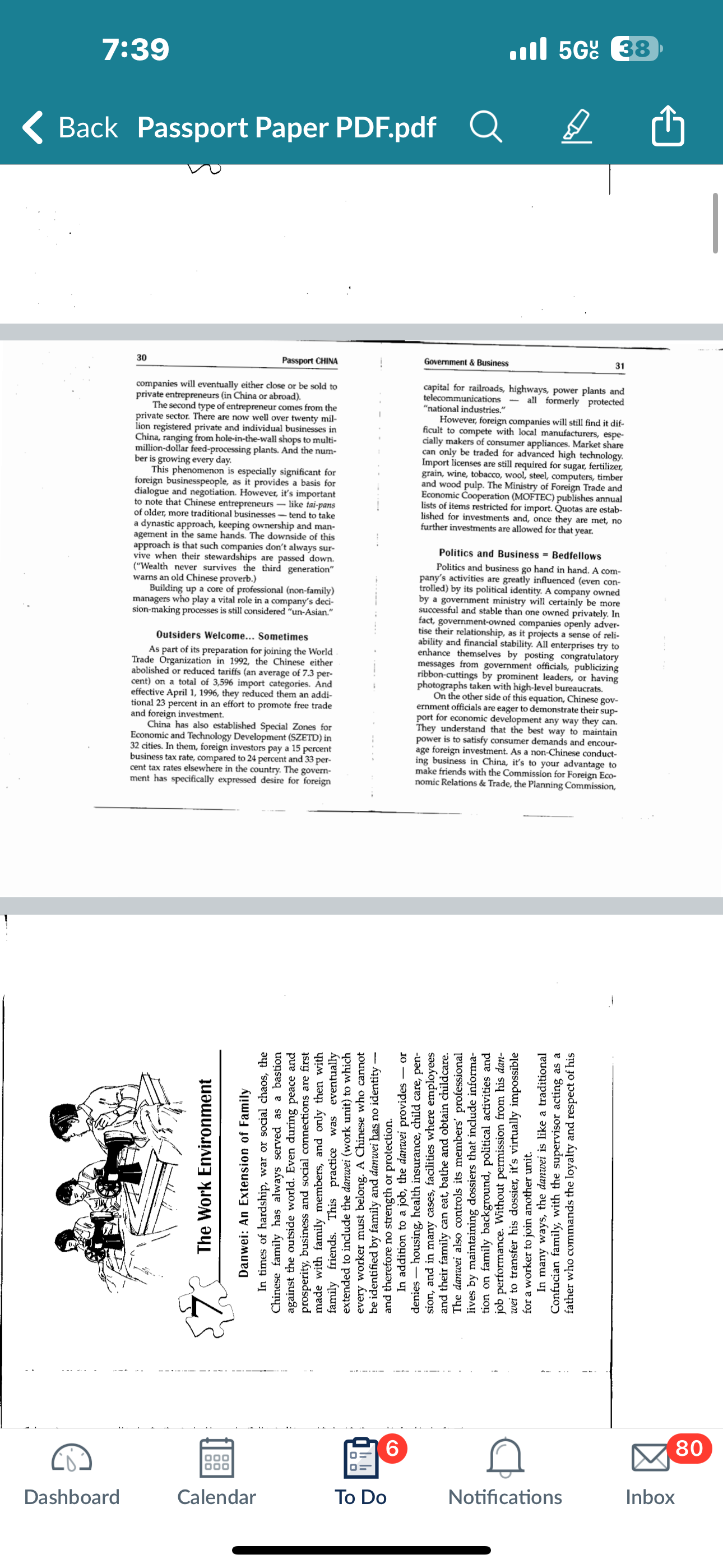
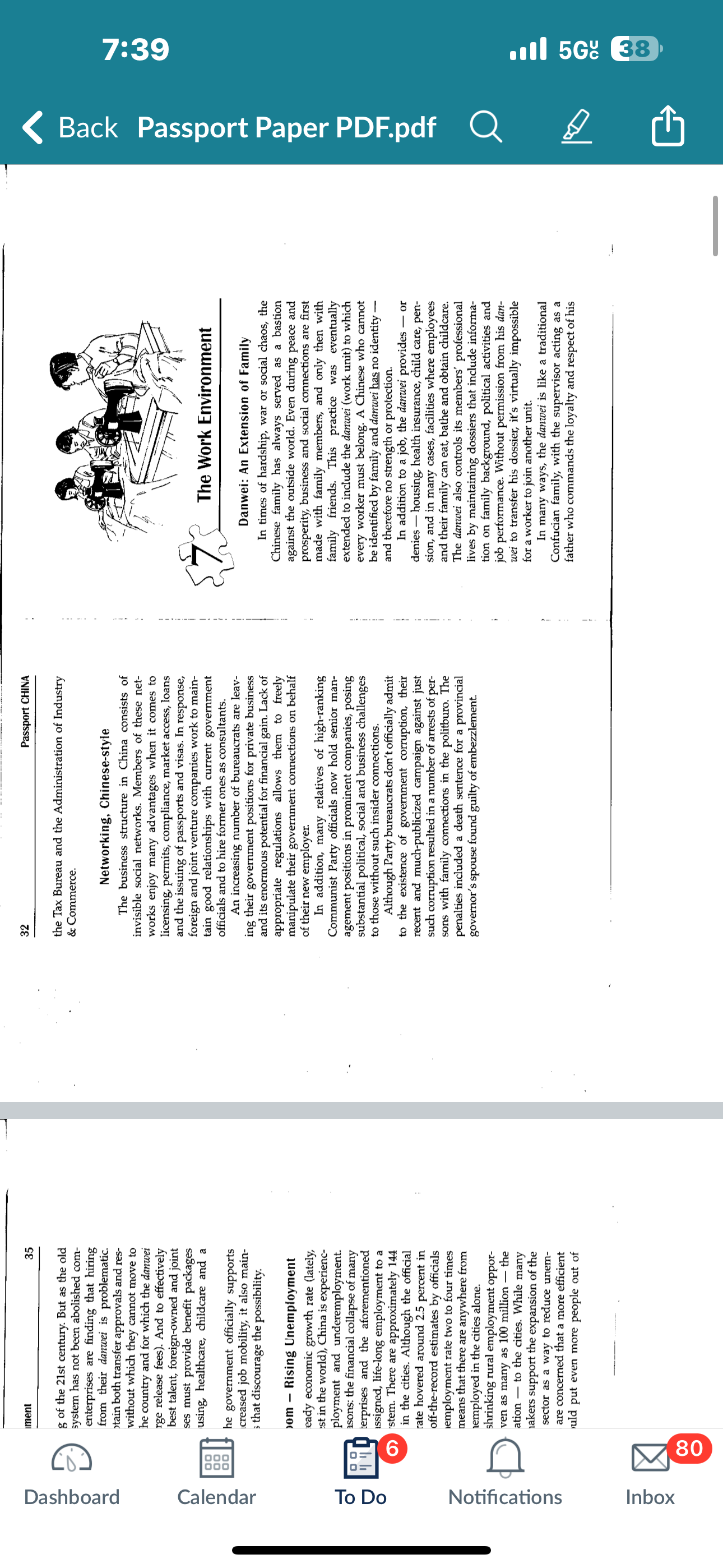
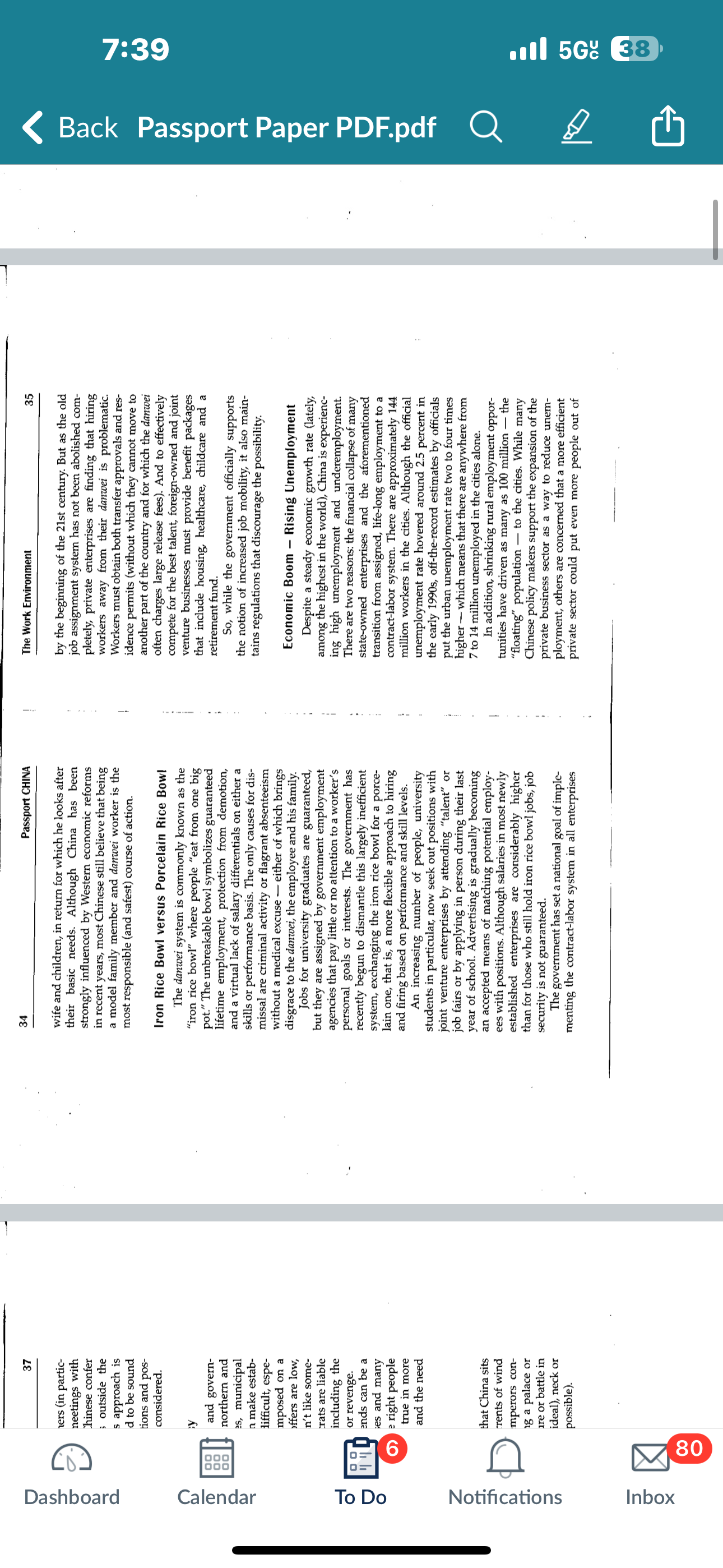
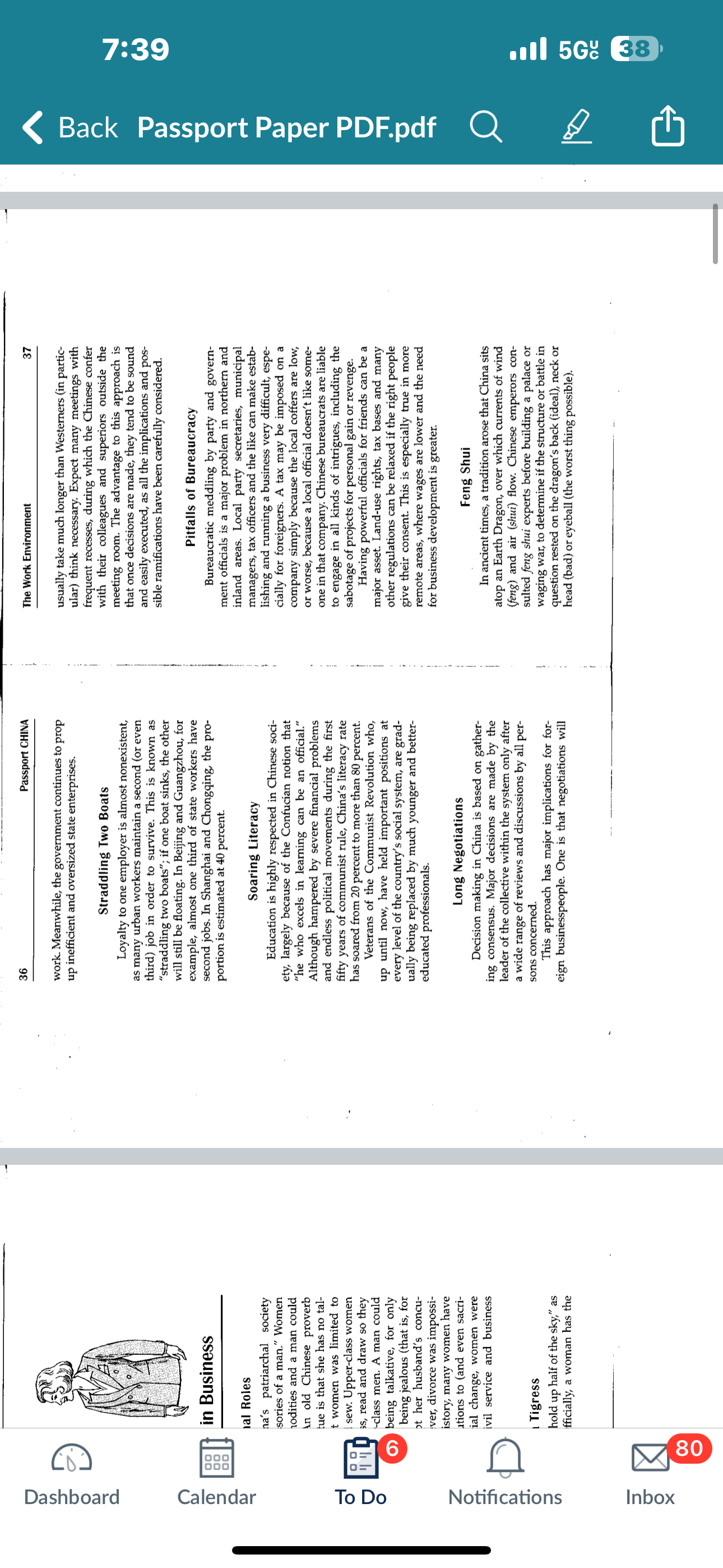
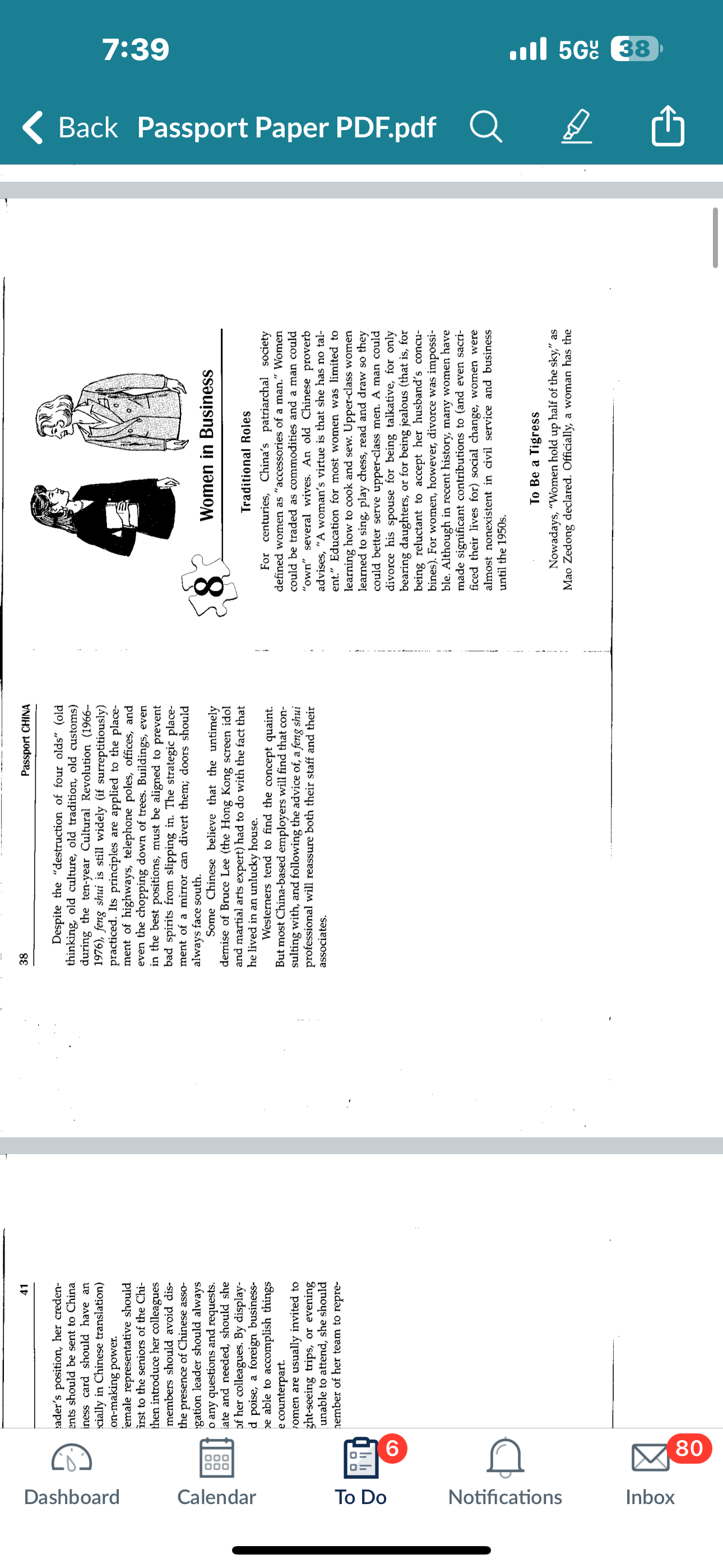
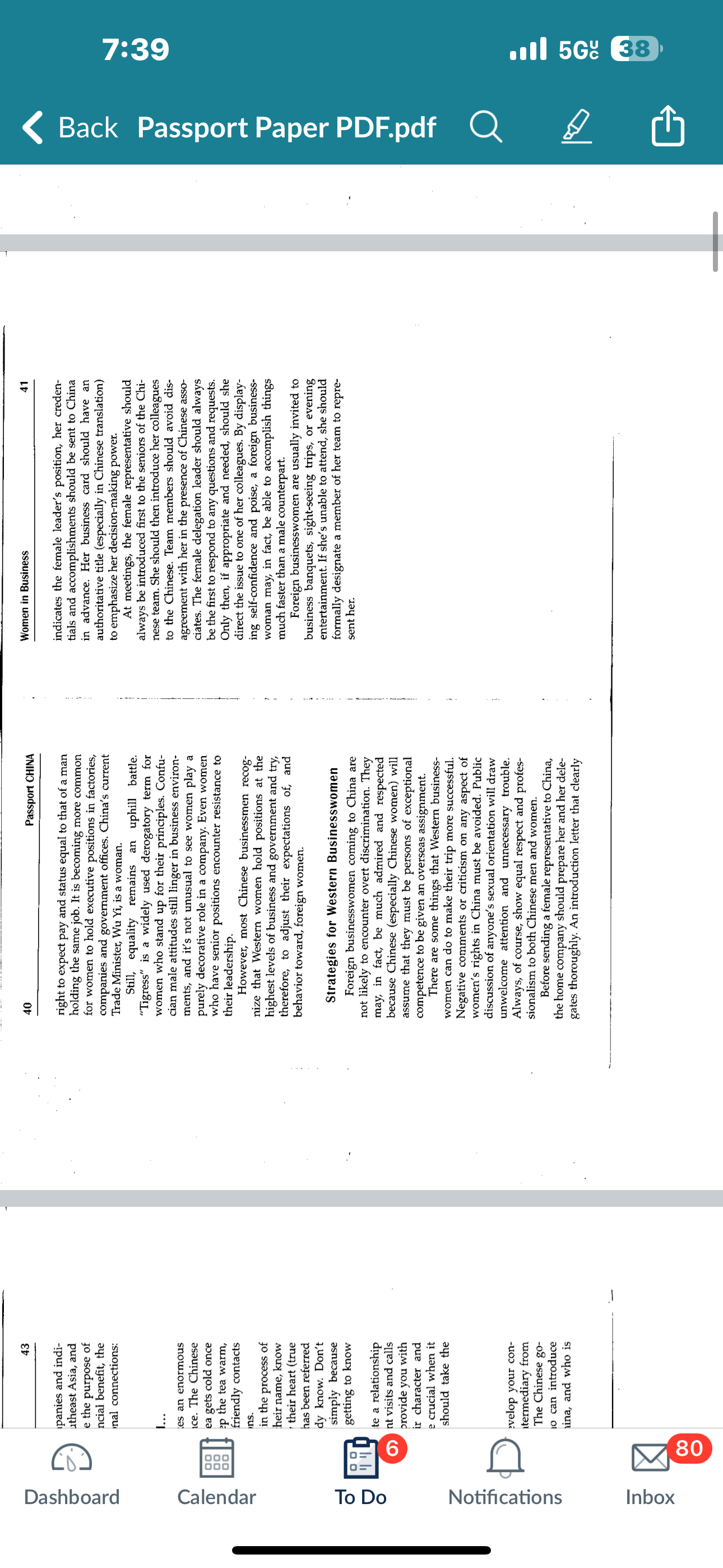
7:39 Back Passport Paper PDF.pdf COM 4430 Paper Topic Ill 5G 38 You need to: Choose one of the country passport documents to read, synthesize, compare and contrast for your paper: o Passport China o Passport France Passport Germany Passport India Passport Israel Passport Italy o Passport Japan Passport Korea o Passport Mexico o Passport Russia Passport Singapore Passport South Africa Passport Spain Passport Switzerland Then, in a 5-7 page paper, compare and contrast the intercultural communication business practices of the country you selected. You will be graded on the content of your answer, the reasoning/argument you make between the theory and the facts of the case study as well as writing (grammar and punctuation). Use at least 4 academic resources (not used in class). Include examples of your own when explaining/analysis your topic. Submit your paper to Turnitin.com. dropbox in Canvas STRUCTURING YOUR PAPER A few words about structuring your paper: A good paper is one that is built around a clear structure, so you should outline the main points of your paper before you start writing. It's easier to overhaul your outline than it is to overhaul a fully written paper, so spend some time thinking about the structure of your paper before you launch into the writing. Your paper should have: A clear introduction A body (in which you flesh out your analysis of rhetoric, audience, artifact, and context) A conclusion (in which you summarize your argument and findings and "open" the paper to consideration of broader themes). WRITING YOUR PAPER A few words about WRITING your paper: I require an "introductory paragraph." It must introduce the topic, state the main argument of the paper, set forth the plan by which the paper unfolds, and state the paper's conclusion. In brief, after having read the first paragraph, your reader should know precisely what the paper is about, its main claims, how it unfolds, and where it will Dashboard end up. Write the noner in coherent noragraphs Each noragraph should flow naturally and 6 Calendar To Do Notifications 80 Inbox 7:39 Back Passport Paper PDF.pdf Ill 5G 38 A A conclusion (in which you summarize your argument and findings and "open" the paper to consideration of broader themes). WRITING YOUR PAPER A few words about WRITING your paper: I require an "introductory paragraph." It must introduce the topic, state the main argument of the paper, set forth the plan by which the paper unfolds, and state the paper's conclusion. In brief, after having read the first paragraph, your reader should know precisely what the paper is about, its main claims, how it unfolds, and where it will end up. Write the paper in coherent paragraphs. Each paragraph should flow naturally and logically from the previous paragraph, and on to the next paragraph, following a clear train of analysis. Good writing is clear writing. Write in simple, declarative sentences. Use the active voice. Feel free to quote from books, articles or experts, but do not waste space with very lengthy quotations - briefly paraphrase these passages instead. A few words about acknowledging and citing sources: Every time you use somebody else's ideas or words, you must acknowledge the source of the information (unless the information is common knowledge). You may acknowledge these sources by using footnotes, endnotes, or in-text notes. Don't get hung up on details of citation style: what really matters is (1) that you cite your sources in such a way that readers can identify your sources and check your facts, and (2) that you use the same citation style throughout the paper. (When citing Internet sources that do not have printed equivalents, identify the author, document title, Internet address, and the date that you retrieved the document.) Append a bibliography at the end of the paper, and include all the sources in APA style that you used in writing the paper. Review the student handbook for plagiarism statement and requirements. SUBMITTING YOUR PAPER When you have completed your paper, re-read it for clarity, grammar, spelling and A few words about submitting your paper: Your paper must be typed in Word Document in double-space in a normal font (e.g., 12-point Times New Roman), number the pages, put your name and student number on the title page. Your research paper should have a title other than "Research Paper". Use at least 4 academic resources (not used in class). Include examples of your own when explaining/analyzing your topic. Submit your paper through Turnitin dropbox (instructions posted online) The paper is due on the date posted in your syllabus. No late submissions will be accepted. The FIU University Learning Center is available on both campuses to support you. They provide personalized attention tailored to your needs in a user-friendly environment that 80 6 Dashboard Calendar To Do Notifications Inbox 7:39 Back Passport Paper PDF.pdf Q Ill 5G 38 Include examples of your own when explaining/analyzing your topic. Use at least 4 academic resources (not used in class). Submit your paper through Turnitin dropbox (instructions posted online) The paper is due on the date posted in your syllabus. No late submissions will be accepted. The FIU University Learning Center is available on both campuses to support you. They provide personalized attention tailored to your needs in a user-friendly environment that includes online support. You can get help writing a paper, reading more efficiently and increasing textbook comprehension, or even creating an individualized learning plan. The center is located in PC 247 (305-348-2180) on the main campus and at ACI 160 (305-919- 5927) on the Biscayne Bay campus. Find them online at http://learningcenter.fiu.edu. Citations South Africa Mitchell, C. (1998). Passport: South Africa. San Rafael: World Trade Press. Singapore Alexandra, K. (1998). Passport: Singapore. San Rafael: World Trade Press. 6 80 Dashboard Calendar To Do Notifications Inbox 7:39 Back Passport Paper PDF.pdf Citations Ill 5G 38 South Africa Mitchell, C. (1998). Passport: South Africa. San Rafael: World Trade Press. Singapore Alexandra, K. (1998). Passport: Singapore. San Rafael: World Trade Press. Spain Novas, H., & Silva, R. (1997). Passport: Spain. San Rafael: World Trade Press. Switzerland Micheloud, F. (2001). Passport: Switzerland. San Rafael: World Trade Press. Russia Mitchell, C. (1998). Passport: Russia. San Rafael: World Trade Press. Italy Gioseffi, C. (1997). Passport: Italy. San Rafael: World Trade Press Israel Rosenthal, D. (1997). Passport: Israel. San Rafael: World Trade Press Germany Flamini, R. (1997). Passport: Germany. San Rafael: World Trade Press France Joseph, N. (1997). Passport: France. San Rafael: World Trade Press Brazil Herrington, E. (1998). Passport: Brazil. San Rafael: World Trade Press China Li, J. (1996). Passport: China. San Rafael: World Trade Press Korea Keating, K. (1998). Passport: Korea. San Rafael: World Trade Press 6 80 Dashboard Calendar To Do Notifications Inbox D 7:39 Back Passport Paper PDF.pdf ..ll 5G 38 Government & Business Good Cats Catch Rats In keeping with its socialist philosophy, the Chi- nese government controls the business sector. And though it claims to have replaced its traditional, planned economy with a market-driven one, the gov- ernment supervises every aspect of this sector, too. Still, their approach is a pragmatic one. Credit is provided to industries that generate more exports, technology is subsidized, developing industries are protected with lower tariffs and private industry (slowly replacing state-owned enterprises) is encouraged. The government explains these policies as part of an emerging, Chinese-style socialism. Perhaps Deng Xiaoping's political proverb puts it best: "It doesn't matter if a cat is black or white, as long as it catches rats." The role of China's government in the country's economic development will remain strong for the foreseeable future. Perpetual Uncertainty One of the most frustrating aspects of investing in China for non-Chinese is that the government Government & Business 29 never discusses new business policies and regula- tions with foreigners, nor announces such changes in advance. (For example, they recently withdrew the tax-free benefits given to foreign joint ventures' imported equipment and added on heavy duties.) The most effective way to deal with such chal- lenges is to have your local Chinese partner or con- sultant work continually on obtaining government clearances or approvals of your project, while maintaining close relationships with local officials at different levels. Perseverance has its rewards. Three major suc- cess stories: Proctor & Gamble has cornered China's sham- poo market with Head & Shoulders (a dandruff product), despite the fact that it costs three times as much as some local brands. Pepsi Cola has twelve factories in China, another nine under construction, and a total investment of $500 million. Volkswagens can be seen negotiating Shanghai's traffic both as private vehicles and as taxi cabs. Lone Dragons Traditionally, most Chinese enterprises were large, state-owned plants and factories infamous for their inefficiency. And until recently, their prof- its and losses were absorbed by the government, thereby creating no incentive for the managers to become better organized. But in recent years, the government has been promoting entrepreneurship. Two types of entrepre- neurs have emerged. The first are managers of state- owned enterprises who have been given fuller con- trol over daily operations and responsibility for prof- its and losses. Depending on their success, these 30 Passport CHINA ber is growing every day. million-dollar feed-processing plants. And the num- a dynastic approach, keeping ownership and man- of older, more traditional businesses-tend to take to note that Chinese entrepreneurs-like tai-pans dialogue and negotiation. However, it's important foreign businesspeople, as it provides a basis for This phenomenon is especially significant for lion registered private and it private sector. There are now well over twenty mil- The second type of entrepreneur comes from the businesses in China, ranging from hole all shops to multi- private entrepreneurs (in China or abroad). companies will eventually either close or be sold to 6 Government & Business further invect Import licenses are lished for investments and, once they are met, no lists of items restricted for import. Quotas are estab- Economic Cooperation (MOFTEC) publishes annual and wood pulp. The Ministry of Foreign Trade and grain, wine, tobacco, wool, steel, computers, timber are still requ can only be traded for advanced high technology. cially makers of consumer appliances. Market share ficult to compete with local manufacturers, espe- However, foreign companies will still find it dif- required for sugar, fertilizer, "national industries.' telecommunications - capital for railroads, highways, power plants and all formerly protected 80 Dashboard Calendar To Do Notifications Inbox 7:39 Back Passport Paper PDF.pdf Ill 5G 38 30 Passport CHINA companies will eventually either close or be sold to private entrepreneurs (in China or abroad). The second type of entrepreneur comes from the private sector. There are now well over twenty mil- lion registered private and individual businesses in China, ranging from hole-in-the-wall shops to multi- million-dollar feed-processing plants. And the num- ber is growing every day. This phenomenon is especially significant for foreign businesspeople, as it provides a basis for dialogue and negotiation. However, it's important to note that Chinese entrepreneurs-like tai-pans of older, more traditional businesses-tend to take a dynastic approach, keeping ownership and man- agement in the same hands. The downside of this approach is that such companies don't always sur- vive when their stewardships are passed down. ("Wealth never survives the third generation" warns an old Chinese proverb.) Building up a core of professional (non-family) managers who play a vital role in a company's deci- sion-making processes is still considered "un-Asian." Outsiders Welcome... Sometimes As part of its preparation for joining the World Trade Organization in 1992, the Chinese either abolished or reduced tariffs (an average of 7.3 per- cent) on a total of 3,596 import categories. And effective April 1, 1996, they reduced them an addi- tional 23 percent in an effort to promote free trade and foreign investment. China has also established Special Zones for Economic and Technology Development (SZETD) in 32 cities. In them, foreign investors pay a 15 percent business tax rate, compared to 24 percent and 33 per- cent tax rates elsewhere in the country. The govern- ment has specifically expressed desire for foreign Government & Business 31 capital for railroads, highways, power plants and telecommunications all formerly protected "national industries." However, foreign companies will still find it dif- ficult to compete with local manufacturers, espe- cially makers of consumer appliances. Market share can only be traded for advanced high technology. Import licenses are still required for sugar, fertilizer, grain, wine, tobacco, wool, steel, computers, timber and wood pulp. The Ministry of Foreign Trade and Economic Cooperation (MOFTEC) publishes annual lists of items restricted for import. Quotas are estab- lished for investments and, once they are met, no further investments are allowed for that year. Politics and Business Bedfellows Politics and business go hand in hand. A com- pany's activities are greatly influenced (even con- trolled) by its political identity. A company owned by a government ministry will certainly be more successful and stable than one owned privately. In fact, government-owned companies openly adver- tise their relationship, as it projects a sense of reli- ability and financial stability. All enterprises try to enhance themselves by posting congratulatory messages from government officials, publicizing ribbon-cuttings by prominent leaders, or having photographs taken with high-level bureaucrats. On the other side of this equation, Chinese gov- ernment officials are eager to demonstrate their sup- port for economic development any way they can. They understand that the best way to maintain power is to satisfy consumer demands and encour- age foreign investment. As a non-Chinese conduct- ing business in China, it's to your advantage to make friends with the Commission for Foreign Eco- nomic Relations & Trade, the Planning Commission, 6 Confucian family, with the supervisor acting as a father who commands the loyalty and respect of his Dashboard Calendar To Do Notifications Inbox 80 iment 32 Passport CHINA 7:39 Back Passport Paper PDF.pdf ..ll 5G g of the 21st century. But as the old system has not been abolished com- enterprises are finding that hiring from their danwei is problematic. ptain both transfer approvals and res- without which they cannot move to he country and for which the danwei rge release fees). And to effectively best talent, foreign-owned and joint ses must provide benefit packages using, healthcare, childcare and a he government officially supports creased job mobility, it also main- that discourage the possibility. >om - Rising Unemployment eady economic growth rate (lately, est in the world), China is experienc- ployment and underemployment. asons: the financial collapse of many terprises and the aforementioned assigned, life-long employment to a stem. There are approximately 144 in the cities. Although the official rate hovered around 2.5 percent in off-the-record estimates by officials employment rate two to four times means that there are anywhere from employed in the cities alone. shrinking rural employment oppor- ven as many as 100 million the ation to the cities. While many akers support the expansion of the sector as a way to reduce unem- are concerned that a more efficient uld put even more people out of the Tax Bureau and the Administration of Industry & Commerce. Networking, Chinese-style The business structure in China consists of invisible social networks. Members of these net- works enjoy many advantages when it comes to licensing, permits, compliance, market access, loans and the issuing of passports and visas. In response, foreign and joint venture companies work to main- tain good relationships with current government officials and to hire former ones as consultants. An increasing number of bureaucrats are leav- ing their government positions for private business and its enormous potential for financial gain. Lack of appropriate regulations allows them to freely manipulate their government connections on behalf of their new employer. In addition, many relatives of high-ranking Communist Party officials now hold senior man- agement positions in prominent companies, posing substantial political, social and business challenges to those without such insider connections. Although Party bureaucrats don't officially admit to the existence of government corruption, their recent and much-publicized campaign against just such corruption resulted in a number of arrests of per- sons with family connections in the politburo. The penalties included a death sentence for a provincial governor's spouse found guilty of embezzlement. The Work Environment Danwei: An Extension of Family In times of hardship, war or social chaos, the Chinese family has always served as a bastion against the outside world. Even during peace and prosperity, business and social connections are first made with family members, and only then with family friends. This practice was eventually extended to include the danwei (work unit) to which every worker must belong. A Chinese who cannot be identified by family and danwei has no identity and therefore no strength or protection. - In addition to a job, the danwei provides or denies - housing, health insurance, child care, pen- sion, and in many cases, facilities where employees and their family can eat, bathe and obtain childcare. The danwei also controls its members' professional lives by maintaining dossiers that include informa- tion on family background, political activities and job performance. Without permission from his dan- wei to transfer his dossier, it's virtually impossible for a worker to join another unit. In many ways, the danwei is like a traditional Confucian family, with the supervisor acting as a father who commands the loyalty and respect of his Dashboard 35 Calendar To Do Notifications Inbox 80 38 Passport CHINA The Work Environment 35 7:39 Back Passport Paper PDF.pdf ..ll 5G hers (in partic- neetings with Chinese confer outside the s approach is d to be sound tions and pos- considered. y and govern- northern and es, municipal n make estab- difficult, espe- mposed on a offers are low, n't like some- crats are liable including the or revenge. ends can be a es and many e right people true in more and the need that China sits rents of wind mperors con- g a palace or are or battle in ideal), neck or possible). wife and children, in return for which he looks after their basic needs. Although China has been strongly influenced by Western economic reforms in recent years, most Chinese still believe that being a model family member and danwei worker is the most responsible (and safest) course of action. Iron Rice Bowl versus Porcelain Rice Bow! The danwei system is commonly known as the "iron rice bowl" where people "eat from one big pot." The unbreakable bowl symbolizes guaranteed lifetime employment, protection from demotion, and a virtual lack of salary differentials on either a skills or performance basis. The only causes for dis- missal are criminal activity or flagrant absenteeism without a medical excuse- either of which brings disgrace to the danwei, the employee and his family. Jobs for university graduates are guaranteed, but they are assigned by government employment agencies that pay little or no attention to a worker's personal goals or interests. The government has recently begun to dismantle this largely inefficient system, exchanging the iron rice bowl for a porce- lain one, that is, a more flexible approach to hiring and firing based on performance and skill levels. An increasing number of people, university students in particular, now seek out positions with joint venture enterprises by attending "talent" or job fairs or by applying in person during their last year of school. Advertising is gradually becoming an accepted means of matching potential employ- ees with positions. Although salaries in most newly established enterprises are considerably higher than for those who still hold iron rice bowl jobs, job security is not guaranteed. The government has set a national goal of imple- menting the contract-labor system in all enterprises by the beginning of the 21st century. But as the old job assignment system has not been abolished com- pletely, private enterprises are finding that hiring workers away from their danwei is problematic. Workers must obtain both transfer approvals and res- idence permits (without which they cannot move to another part of the country and for which the danwei often charges large release fees). And to effectively compete for the best talent, foreign-owned and joint venture businesses must provide benefit packages that include housing, healthcare, childcare and a retirement fund. So, while the government officially supports the notion of increased job mobility, it also main- tains regulations that discourage the possibility. - Economic Boom Rising Unemployment Despite a steady economic growth rate (lately, among the highest in the world), China is experienc- ing high unemployment and underemployment. There are two reasons: the financial collapse of many state-owned enterprises and the aforementioned transition from assigned, life-long employment to a contract-labor system. There are approximately 144 million workers in the cities. Although the official unemployment rate hovered around 2.5 percent in the early 1990s, off-the-record estimates by officials put the urban unemployment rate two to four times higher which means that there are anywhere from 7 to 14 million unemployed in the cities alone. In addition, shrinking rural employment oppor- tunities have driven as many as 100 million the "floating" population to the cities. While many Chinese policy makers support the expansion of the private business sector as a way to reduce unem- ployment, others are concerned that a more efficient private sector could put even more people out of 37 34 Dashboard Calendar To Do Notifications Inbox 80 38 7:39 Back Passport Paper PDF.pdf ..ll 5G 38 in Business al Roles na's patriarchal society sories of a man." Women hodities and a man could An old Chinese proverb tue is that she has no tal- t women was limited to sew. Upper-class women ss, read and draw so they -class men. A man could being talkative, for only being jealous (that is, for ot her husband's concu- ver, divorce was impossi- istory, many women have ations to (and even sacri- ial change, women were ivil service and business Tigress hold up half of the sky," as fficially, a woman has the 36 Passport CHINA work. Meanwhile, the government continues to prop up inefficient and oversized state enterprises. Straddling Two Boats Loyalty to one employer is almost nonexistent, as many urban workers maintain a second (or even third) job in order to survive. This is known as "straddling two boats"; if one boat sinks, the other will still be floating. In Beijing and Guangzhou, for example, almost one third of state workers have second jobs. In Shanghai and Chongqing, the pro- portion is estimated at 40 percent. Soaring Literacy Education is highly respected in Chinese soci- ety, largely because of the Confucian notion that "he who excels in learning can be an official." Although hampered by severe financial problems and endless political movements during the first fifty years of communist rule, China's literacy rate has soared from 20 percent to more than 80 percent. Veterans of the Communist Revolution who, up until now, have held important positions at every level of the country's social system, are grad- ually being replaced by much younger and better- educated professionals. Long Negotiations Decision making in China is based on gather- ing consensus. Major decisions are made by the leader of the collective within the system only after a wide range of reviews and discussions by all sons concerned. per- This approach has major implications for for- eign businesspeople. One is that negotiations will The Work Environment 37 usually take much longer than Westerners (in partic- ular) think necessary. Expect many meetings with frequent recesses, during which the Chinese confer with their colleagues and superiors outside the meeting room. The advantage to this approach is that once decisions are made, they tend to be sound and easily executed, as all the implications and pos- sible ramifications have been carefully considered. Pitfalls of Bureaucracy Bureaucratic meddling by party and govern- ment officials is a major problem in northern and inland areas. Local party secretaries, municipal managers, tax officers and the like can make estab- lishing and running a business very difficult, espe- cially for foreigners. A tax may be imposed on a company simply because the local coffers are low, or worse, because a local official doesn't like some- one in that company. Chinese bureaucrats are liable to engage in all kinds of intrigues, including the sabotage of projects for personal gain or revenge. Having powerful officials for friends can be a major asset. Land-use rights, tax bases and many other regulations can be relaxed if the right people give their consent. This is especially true in more remote areas, where wages are lower and the need for business development is greater. Feng Shui In ancient times, a tradition arose that China sits atop an Earth Dragon, over which currents of wind (feng) and air (shui) flow. Chinese emperors con- sulted feng shui experts before building a palace or waging war, to determine if the structure or battle in question rested on the dragon's back (ideal), neck or head (bad) or eyeball (the worst thing possible). Dashboard Calendar To Do Notifications Inbox 80 7:39 Back Passport Paper PDF.pdf .ill 5G 41 ader's position, her creden- ents should be sent to China iness card should have an cially in Chinese translation) on-making power. female representative should irst to the seniors of the Chi- then introduce her colleagues members should avoid dis- the presence of Chinese asso- gation leader should always o any questions and requests. late and needed, should she of her colleagues. By display- d poise, a foreign business- be able to accomplish things e counterpart. omen are usually invited to ght-seeing trips, or evening unable to attend, she should hember of her team to repre- 38 Passport CHINA Despite the "destruction of four olds" (old thinking, old culture, old tradition, old customs) during the ten-year Cultural Revolution (1966 1976), feng shui is still widely (if surreptitiously) practiced. Its principles are applied to the place- ment of highways, telephone poles, offices, and even the chopping down of trees. Buildings, even in the best positions, must be aligned to prevent bad spirits from slipping in. The strategic place- ment of a mirror can divert them; doors should always face south. Some Chinese believe that the untimely demise of Bruce Lee (the Hong Kong screen idol and martial arts expert) had to do with the fact that he lived in an unlucky house. Westerners tend to find the concept quaint. But most China-based employers will find that con- sulting with, and following the advice of, a feng shui professional will reassure both their staff and their associates. Women in Business Traditional Roles For centuries, China's patriarchal society defined women as "accessories of a man." Women could be traded as commodities and a man could "own" several wives. An old Chinese proverb advises, "A woman's virtue is that she has no tal- ent." Education for most women was limited to learning how to cook and sew. Upper-class women learned to sing, play chess, read and draw so they could better serve upper-class men. A man could divorce his spouse for being talkative, for only bearing daughters, or for being jealous (that is, for being reluctant to accept her husband's concu- bines). For women, however, divorce was impossi- ble. Although in recent history, many women have made significant contributions to (and even sacri- ficed their lives for) social change, women were almost nonexistent in civil service and business until the 1950s. To Be a Tigress Nowadays, "Women hold up half of the sky," as Mao Zedong declared. Officially, a woman has the Dashboard Calendar To Do Notifications Inbox 80 38 7:39 Back Passport Paper PDF.pdf ..ll 5G 38 43 panies and indi- utheast Asia, and e the purpose of ncial benefit, the nal connections: es an enormous ice. The Chinese ea gets cold once ep the tea warm, friendly contacts ns. in the process of heir name, know their heart (true has been referred dy know. Don't simply because getting to know te a relationship nt visits and calls provide you with ir character and e crucial when it should take the evelop your con- termediary from The Chinese go- o can introduce ina, and who is 40 Passport CHINA right to expect pay and status equal to that of a man holding the same job. It is becoming more common for women to hold executive positions in factories, companies and government offices. China's current Trade Minister, Wu Yi, is a woman. Still, equality remains an uphill battle. "Tigress" is a widely used derogatory term for women who stand up for their principles. Confu- cian male attitudes still linger in business environ- ments, and it's not unusual to see women play a purely decorative role in a company. Even women who have senior positions encounter resistance to their leadership. However, most Chinese businessmen recog- nize that Western women hold positions at the highest levels of business and government and try, therefore, to adjust their expectations of, and behavior toward, foreign women. Strategies for Western Businesswomen Foreign businesswomen coming to China are not likely to encounter overt discrimination. They may, in fact, be much admired and respected because Chinese (especially Chinese women) will assume that they must be persons of exceptional competence to be given an overseas assignment. There are some things that Western business- women can do to make their trip more successful. Negative comments or criticism on any aspect of women's rights in China must be avoided. Public discussion of anyone's sexual orientation will draw unwelcome attention and unnecessary trouble. Always, of course, show equal respect and profes- sionalism to both Chinese men and women. Before sending a female representative to China, the home company should prepare her and her dele- gates thoroughly. An introduction letter that clearly Women in Business 41 indicates the female leader's position, her creden- tials and accomplishments should be sent to China in advance. Her business card should have an authoritative title (especially in Chinese translation) to emphasize her decision-making power. At meetings, the female representative should always be introduced first to the seniors of the Chi- nese team. She should then introduce her colleagues to the Chinese. Team members should avoid dis- agreement with her in the presence of Chinese asso- ciates. The female delegation leader should always be the first to respond to any questions and requests. Only then, if appropriate and needed, should she direct the issue to one of her colleagues. By display- ing self-confidence and poise, a foreign business- woman may, in fact, be able to accomplish things much faster than a male counterpart. Foreign businesswomen are usually invited to business banquets, sight-seeing trips, or evening entertainment. If she's unable to attend, she should formally designate a member of her team to repre- sent her. Dashboard To Do Notifications Inbox 80
Step by Step Solution
There are 3 Steps involved in it
Step: 1

Get Instant Access to Expert-Tailored Solutions
See step-by-step solutions with expert insights and AI powered tools for academic success
Step: 2

Step: 3

Ace Your Homework with AI
Get the answers you need in no time with our AI-driven, step-by-step assistance
Get Started


